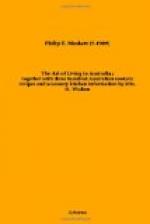THE FOOD VALUE OF FISH.
Along with its great ally, the oyster, fish undoubtedly occupies one of the highest places on the food list. Unfortunately, it is not met with in every home as it should be, its high price and scarcity combining to make it conspicuous by its absence. That such a state of things is actually the case in Australia can only be deeply deplored. Let us suppose, for instance, that we were as well supplied with fish as we are entitled to be, considering that we are of a maritime race and that we live near the sea. If such were the case—and I would it were so— how would a sudden reversal to the present state of our fish supply be received? Would it not give rise to protestations, to indignation meetings, to questionings in the House, and to the papers being filled with complaints, till matters were put right again? Yes, indeed, all these things would happen! meanwhile, however, we continue placidly in our fishless state of existence, and the finny tribe, outside in the deep sea, have a good time in consequence.
It may seem of little use, therefore, to call attention to the value of fish when we are practically bereft of it. But as some improvement may come about in course of time, the attempt will not be altogether thrown away. First of all, then, it is worthy of note that in the old country that advocate for rational feeding, Sir Henry Thompson, has recently expressed his opinion that a large proportion of the town population would profit by exchanging some of their meat, as an article of daily diet, for fish. He further adds that the digestive system is apt to become overloaded and oppressed by meals consisting chiefly of meat, and that many a constitution suffers from an over-supply in this way, which cannot be remedied without a considerable amount of exercise. That being the case in the old country, with its cold, damp climate, these facts are intensified a thousandfold when they are applied to our semi-tropical existence. Dr. T. K. Chambers, also, another authority on all that pertains to diet, is an advocate for a more general use of fish in our daily life; and, as he sagely observes, every sort is best when it is cheapest, for it is then most plentiful and in fullest season. Then, again, we have Dr. F.W. Pavy, who is well qualified




